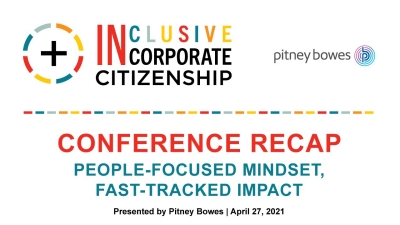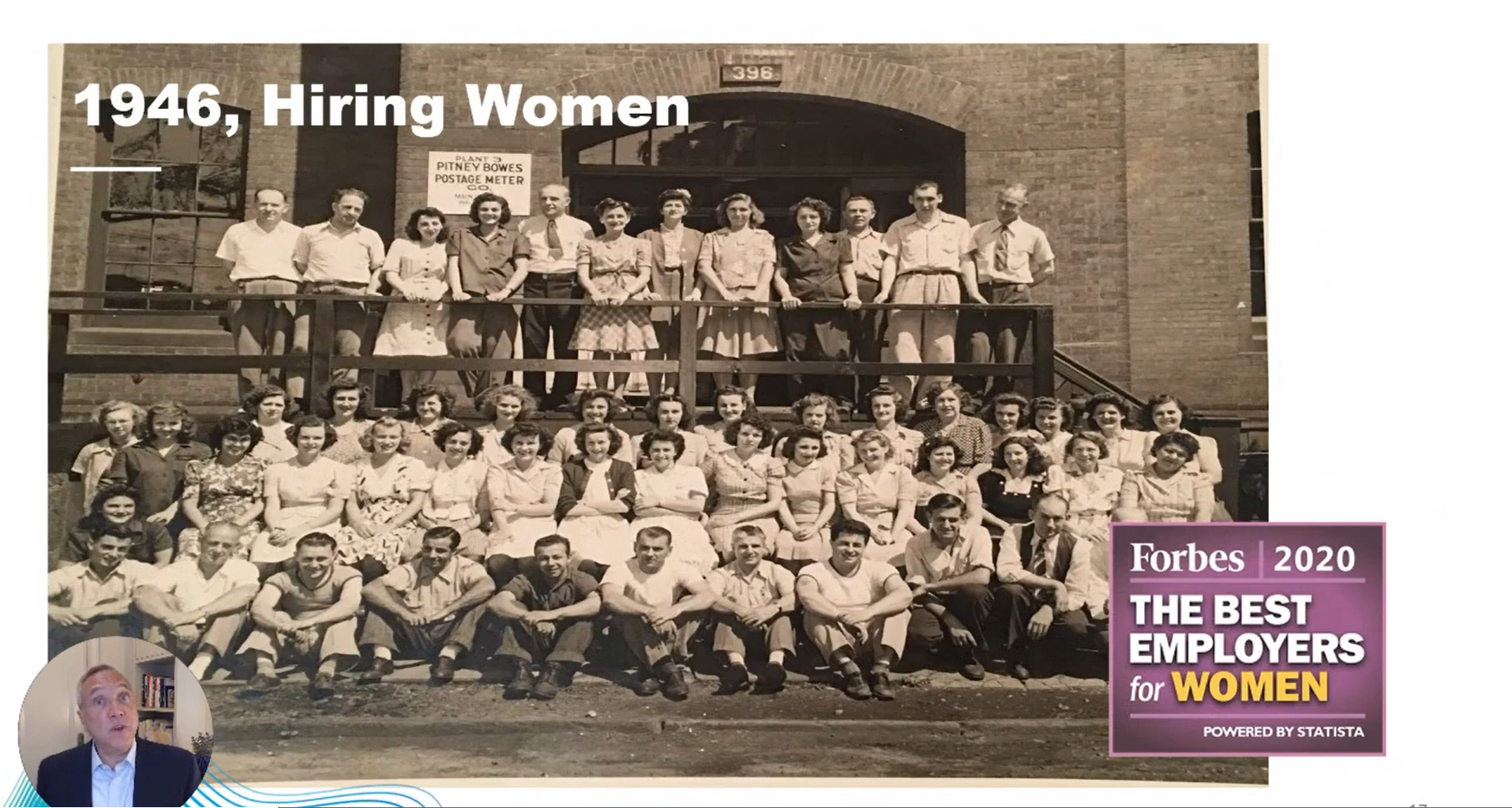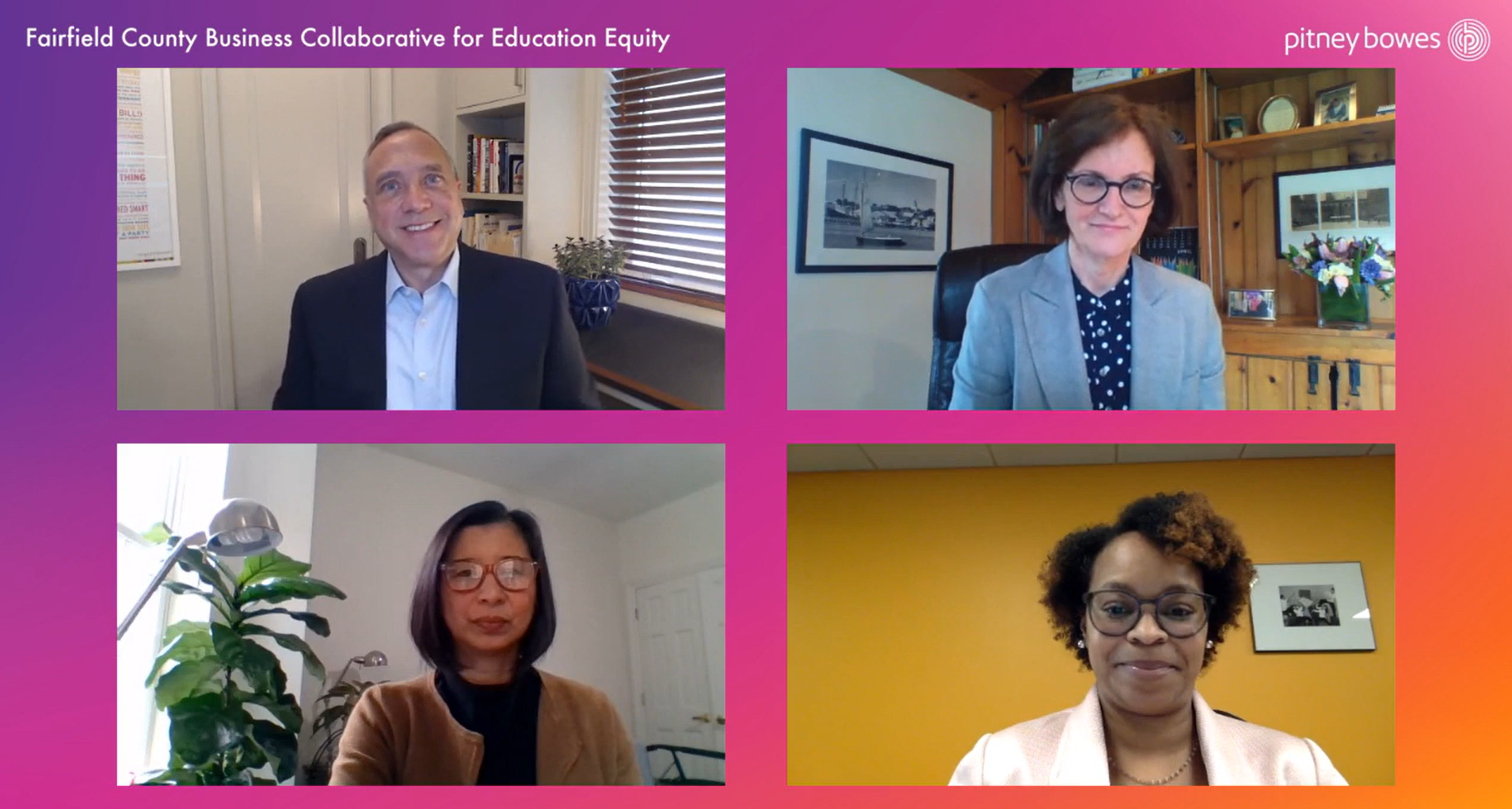Check out the latest findings and best practices from BCCCC's Community Involvement Board, comprised of corporate leaders working in corporate giving, community relations, and related roles.
2021 Conference Recap: People-focused mindset, fast-tracked impact

Roaring into Day 2 of the virtual International Corporate Citizenship Conference, attendees left morning networking sessions excited to absorb valuable lessons about renewing and continuously improving CSR programs from session sponsor Pitney Bowes.
Attendees looked forward to actionable insights that built on what they had learned the previous day, especially on effectively leveraging cross-sector partnerships. In the prior day’s breakout session “Profound partnerships to achieve the Sustainable Development Goals,” participants learned from practitioners at Dupont, Microsoft, Sanofi, and UL that when partnerships seek to tackle complex issues, they need be measurable and scalable, start with common goals, and address adjacent issues. Tina Vaughn at UL discussed her company’s now award-winning partnership with Watts of Love, which took home the top prize at the previous night’s Film Festival Awards.
In today’s first session, participants settled in to learn about a unique collaboration convened by Pitney Bowes that connects the resources of both the private and public sectors. Colleen Olphert, membership director for the Boston College Center for Corporate Citizenship, introduced our first speaker from Pitney Bowes, Bill Borrelle, senior vice president and chief marketing officer. After a brief introduction, Borrelle moderated a panel with Kathleen Ryan Mufson, director of global corporate citizenship and philanthropy, and president, Pitney Bowes Foundation, who was joined by representatives from the company's corporate and community partners in supporting students in underserved school districts: Denise Yap, senior vice president of corporate citizenship at Synchrony, and Janeene Freeman, director of education and youth development at Fairfield County’s Community Foundation.
In recognition of the company's 100-year anniversary, Borrelle shared that while Pitney Bowes' business model has adapted throughout the years, the company has always been rooted in people-driven values. One of its earliest CEOs, Walter Wheeler, believed in employing “qualified people regardless of race, color, or religion,” and pushed to maintain the higher ratio of women working at the company as a result of World War II. These values have withstood the test of time, and Pitney Bowes is still highly recognized as an employer of diverse and underrepresented communities.
When the COVID-19 pandemic hit, this inclusion mindset shone bright. “We wanted to address the urgent needs and the disparities within our communities by helping our nonprofit partners and those they served,” said Borrelle. “We sensed that we needed to do something different altogether to respond to the pandemic and the calls for racial justice.”
At the urging of CEO Marc Lautenbach, Pitney Bowes began a conversation with other companies in Fairfield County, CT, where the company operates, on how to join philanthropic efforts to address growing inequities in education. The resulting initiative, the Fairfield County Business Collaborative for Education Equity, convenes local organizations from the corporate sector, such as Bank of America and Synchrony, along with nonprofits and charitable foundations, to pool funding and ideas that generate collective solutions.
Borrelle brought up the other panelists to discuss how the project came together and how they charted a course forward on education equity. Since the initial convening and working group meeting in August 2020, the collaborative has been able to make a huge impact at a rapid pace. From policy advocacy to in-kind donations of supplies to volunteerism to general funding of projects, the collaborative has impacted at least 25,000 student experiences across 39 public schools in the region.
“We came together on an urgent and systemic issue that we were all invested in. We had quick wins right out of the gate,” said Mufson. “We were rolling up our sleeves, doing this work together, and the momentum was building. But at the same time, we had our sights set on the longer term. This is a systemic issue, this isn't about just a few months—this is about persistence and resilience.”
“At Synchrony, we feel we have a responsibility to our communities, so when [Mufson] came to us with this idea, we were ‘all-in,’” said Yap. “The idea of working with our colleagues across the county, in both large and small businesses, was something unique. Coming together to address an issue that is very apparent—we're doing something that not many communities are doing.”
“By partnering with the business sector in our region, we know that we will have an opportunity to deepen our impact by pooling resources together,” said Freeman. For her community foundation, the initiative will help to address funding gaps and support initiatives that her foundation knows will boost student achievement, especially among the most vulnerable students. She went on, “I think we all have a mutual interest in creating a more equitable Fairfield County. We clearly have a lot of work to do, and in order to do it we have to work together.”
Attendees left the session with much to think about, and in the spirit of collaboration joined networking tables and practical breakout sessions to discuss the ideas of the day.
We’re blogging throughout the 2021 International Corporate Citizenship Conference to give you daily recaps and deep dives into the event’s unique content.
Participate in the conversation using #BCConf21.
Visit the Corporate Citizenship Perspectives Blog to read all the recaps and subscribe to receive blog updates.
Related Content
Check out the latest findings and best practices from BCCCC's ESG Reporting Board, comprised of corporate leaders working in sustainability reporting.
Check out the latest findings and best practices from BCCCC's Sustainability in Manufacturing & Retail Board, comprised of corporate leaders whose roles address emerging regulation, changes in consumer preferences, and the need to manage ESG risks and opportunities throughout value chains.
Check out the latest findings and best practices from BCCCC's Professional Services Sustainability Board
Check out the latest findings and best practices from BCCCC's Opportunity, Inclusion & Workforce Engagement Board, comprised of corporate leaders working in inclusion, belonging, and employee engagement roles.
Check out the latest findings and best practices from BCCCC's Health Equity Board, comprised of corporate leaders from a variety of industries, all exploring social determinants of health and efforts to support more equitable health outcomes.
This month’s Member Meetup highlighted how CSR teams work alongside government relations colleagues.
In today's complex business environment, many corporate citizenship leaders are working strategically with their employee resource groups (ERGs). Also known as business network groups or affinity groups, these employee-led communities can foster a sense of inclusion and belonging, while sponsoring events and learning opportunities for people all throughout an organization.




